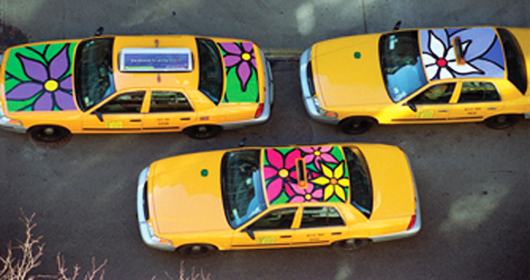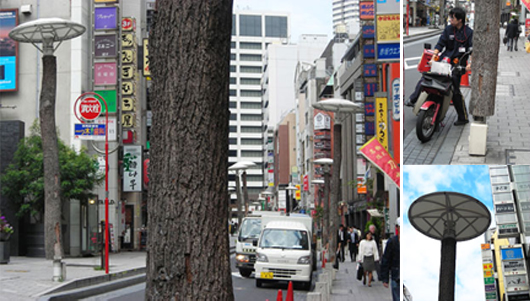
Last year since 2007 September until years end New York City has visually transformed. Taxi, yellow icon, blossomed in all colors and became a mobile artistic canvas, or Garden in Transit. continue reading
April 23, 2008
Category: ⚐ EN+city+design+mobility+the environment

Last year since 2007 September until years end New York City has visually transformed. Taxi, yellow icon, blossomed in all colors and became a mobile artistic canvas, or Garden in Transit. continue reading
Category: ⚐ EN+city+the environment

The typical characteristic of modern Japanese cities, most evident in Tokyo, is a chaotic, patchwork-like, urban environment filled with high-density residential and commercial areas close to industrial plants. Tokyo is known for hypermodern architecture, skyscrapers and looks like a future city. But how do people actually live in this concrete urbanity? continue reading
December 28, 2007
We can all be Makeadores. Anyone who can find valuable what others discarded is a Makeador. The alterego of the person that appears at the very moment he/she is about to make the action of reusing.
It comes and goes, it shows in temporary situations when we are looking for something. Makear comes from “make up”, mending, customising, personalising, repairing, tuning, adapting, sorting out… you make it pretty.
In today’s consumer society, brands are any word, name, symbol or object used for identifying and distinguishing articles by a particular producer from those made by competitors. They infer certain personality and image to the products, so that they become dependant on the brand.
Now MAKEA is born. An alternative to the “use & dispose” culture. MAKEA is a brand that doesn’t sell anything. It represents an attitude of resistance.
MAKEA is the collective intelligence and creativity that turns into useful again what the consumer society has rejected. The idea is to bring back the motto “do it yourself”, extending the useful life of products, going back to knowing how to make things, breaking with the “empty wasting commodity” that sells in boxes the consumer culture.
I bet you are curious to see what we are talking about… well, then, check out this website: makeatuvida.net
December 22, 2007
At the last negotiations about climate change held in Bali, USA, Canada and Japan were against a post-Kyoto treaty to stop global warming and are convincing other delegates to do the same.
It seems that these countries are happy to continue polluting the atmosphere as they please –and the rest of the planet will pay the consequences. Most wealthy countries had agreed to drastically reduce polluting emissions by year 2020 – a key move, according to experts, to stop climate change. Countries like China and India, and other large developing countries, won’t commit to the treaty until all developed countries do. This news is worrying. As well as USA, who did the same they did in Kyoto, now Japan and Canada refuse to even mention a global agreement to reduce CO2 and other polluting emissions.
Source: www.avaaz.org
November 6, 2007
Why a black google? Some studies say that having a black background instead of white helps saving energy. Based on these results, Heap Media Australia has created a black version of google they have named BLACKLE. For more info on this project, its characteristics, history, critics, you can check wikipedia (what else!). One of the advantages: there is no publicity. One of the disadvantages: it doesn’t have as many functions as google. Besides, there are different opinions about its efficiency: according to some research, for LCD screens the energy use could even be higher. Once again, energy efficiency is not all that simple. These are some of the tips that the official google site offers in respect of this matter.
October 5, 2007
Some weeks ago, Ecosistema Urbano created an account in Facebook. If you don’t know it yet, Facebook is a social network, a phenomenon that some experts think has the potential to become a giant of the size of google, Yahoo or Amazon.
The motive for opening this account is simple: we want to develop a network of creative people interested on areas related to architecture, city and design; people who constantly think about sustainability in their work, and aim to maintain and increase urban vitality.
We understand this blog as a meeting point for all this people and a social network as the best tool for them to meet and communicate.
For this purpose we have created in Facebook the group [ecosistema urbano]:abierto where all our readers can join in exchange for a text introducing themselves which we will publish in this blog.
We want to meet our readers and we want them to have the possibility to publish in the blog.
If you want to be part of the group, send us your text – write about what you want; we have conceived it as an introductory text, but you can make it anything you like. You can tell us about yourselves or about your interests.
The texts, which should contain less than 3000 characters, will be published in the blog under the category eu:abierto, and they can include links to sites you want to recommend.
For publishing and joining the Facebook group [ecosistema urbano]:abierto you can send me an email at domenico@ecosistemaurbano.com
October 4, 2007
We bring you more opinions about biodiesel. Now is the turn for an published in the newly born Spanish paper Público: “green cars pollute too”. It talks, for instance, about the ban implemented in Norway to use the word “ecologic” in automobile publicity. Another interesting aspect is the debate that has started in the Spanish version of the blog following the previous article on this topic: bloggers’ comments, related news, etc.
On the same topic, check his link to flickr.
October 2, 2007
“eutv” (Ecosistema Urbano TV) goes ahead. At the office we are working on the design of a logo that will shortly be ready. Meanwhile, the collective task involved in defining the project goes on on the internet. So far, at the project website eutv.pbwiki.com we have registered a proposal by juan freire, which we find particularly interesting. Juan proposes developing a Ranking of cities to help publicising the project: Over the last few months a number of initiatives for comparing cities have come up, based on rankings that use different indices to quantify the degree in which cities are creative, green, sustainable, innovative… Despite these exercises being very criticisable for the methodology used as well as often for their consequences (sometimes they lead to a “city race” in which all cities want to be like each other), they generate great interest amongst politicians and the public, and they can have positive applications (they can point out weaknesses and define routes for change). In this project, work could be done with sustainability indices for Spanish cities, for example. A number of variables could be defined and the results could be compiled in a cooperative manner. These results could be published broadly and could be an instrument for making the project better known within the media, amongst politicians or the public. In a few days I will publish in Ciudades enredadas, a blog in ADN.es, a post with the analysis of different international city indices that have lately appeared in the media. It can be useful as a guide.
What do you think these indices could be?
The following headline in Spanish paper ELPAIS on 12th September has caught my attention:
“Biofuels don’t reduce CO2 emissions. This statement opens the interview of Chemistry Nobel Prize Winner Hartmut Michel. The interview questions the suitability of biofuel. I am not an expert, so I can simply recommend the article.
These are further extracts from the interview:
“to produce biofuel, such as ethanol, it is necessary to invest much energy in the shape of fertilizers, transport, as well as on distilling the alcohol. (…)Nearly as much energy is required as that later found in the ethanol. And if you obtain that energy from fossil fuel, you end up emitting more CO2 than you would if you simply used petrol in your car.”
“Biofuels are promoting the loss of tropical jungle in Indonesia, Malaysia, some regions in Africa and Brazil. In Brazil the issue is soya: more and more soya is being cultivated in the jungle. Burning up the jungle in order to produce soya liberats an enormous amount of carbon dioxide into the atmosphere.”